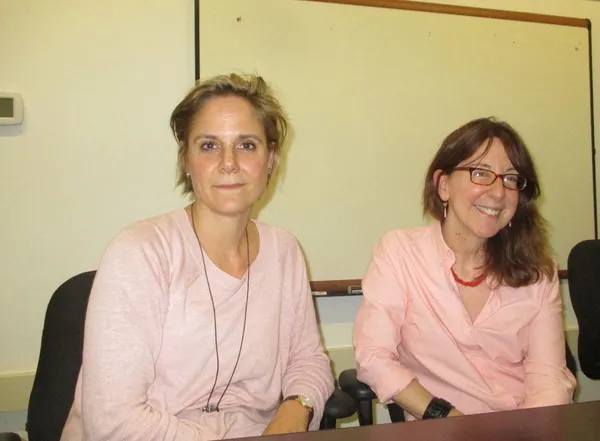 |
| Letters From Baghdad directors Sabine Krayenbühl and Zeva Oelbaum: "In Tilda Swinton's voice, exactly - this dialogue becomes very immediate." Photo: Anne-Katrin Titze |
On the afternoon following the Presidential election and the day before DOC NYC kicks off, Sabine Krayenbühl and Zeva Oelbaum met with me for a conversation on their terrific documentary on Gertrude Bell, Letters From Baghdad. The discussion led us to the social circles of Virginia Woolf and Vita Sackville-West, Winston Churchill and TE Lawrence with Bell in the desert, Whirling Dervishes, a maypole dance, Dorothy Arzner's Christopher Strong starring Katharine Hepburn, Werner Herzog's Queen Of The Desert with Nicole Kidman, and Ridley Scott's interest in the Desert Queen, executive producer Thelma Schoonmaker, finding the right tone, costume designer Allison Wyldeck, and Ahead Of Time: The Extraordinary Journey Of Ruth Gruber.
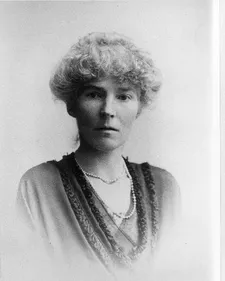 |
| "It was always a balance between history and information and getting into Gertrude Bell's mind and exploring her emotions." |
Through an excellent selection of archival footage mixed with Gertrude Bell's photographs, we are taken on a journey with a woman who was determined to make a difference. And she did on her own terms. Tilda Swinton gives her voice to Gertrude, reading her letters sent back to her father in England and those whom she admired (mostly men). The unusual and in this case very effective choice to have impeccably dressed actors talk to the camera in their roles as Bell's contemporaries, gives the documentary a charming playfulness. From being confronted by TE Lawrence to being an Ottoman Empire concern, she overcame a remarkable number of barriers put in front of her.
Fluent in Arabic, Oxford educated Bell, turned archeologist, explorer, writer, photographer, cartographer and suspected spy to be appointed Iraq's Honorary Director of Antiquities following the First World War, had a fascinating life that far too few know about. She left her formidable mark on more than just the maps of the world.
Anne-Katrin Titze: I had planned to start by talking about this historic day in connection to Gertrude Bell. Well, the election did not turn out that way.
Sabine Krayenbühl: We were thinking about that too. I mean in one way it makes now the film even more important because of this idea of bringing forth the story of women who have done things ahead of their time and persevered and contributed to history in ways, like Gertrude Bell. It's even more important now to tell these stories.
AKT: Absolutely!
_225.webp) |
| Tilda Swinton is the voice of Gertrude Bell and an executive producer Photo: Anne-Katrin Titze |
SK: So that young women know - women in general - see that this goes back a long time and we have to tell their stories.
Zeva Oelbaum: It becomes even more urgent. There are precedents out there and if they continue to be not in the picture or written out of history we can't build on them.
AKT: That is the point with Gertrude Bell. How many people know about her? Very few. I love the moment with TE Lawrence, where you show the smugness, questioning her for an hour and a half. It speaks exactly of the obstacles, the smugness. Overall, I felt you did a marvelous job combining the different elements of this film. Let's start with the actors. It's a daring choice to have actors read the original letters and diaries and you really pull it off. Can you talk about this choice?
SK: Sure. Well, the idea was for us to initially use Gertrude Bell's letters and tell the film from her point of view. But it was very clear that to have one voice for 90 minutes and only her point of view would give a very one-dimensional story. So we wanted to have her contemporaries, we wanted to have other voices included. We never wanted to make a film in the traditional historical documentary sense where you have archeologists, historians, contemporaries looking back.
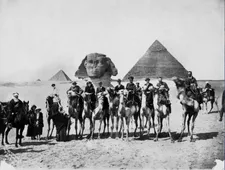 |
| Gertrude Bell bookended by Winston Churchill and TE Lawrence |
The idea is - let's bring, let's transport the viewer into that time and experience what happened firsthand. So the dialogue that happens between the actors and Gertrude Bell, whom we don't see, but hear and find out so much information about in her own words …
AKT: … in Tilda Swinton's voice!
SK: In Tilda Swinton's voice, exactly - this dialogue becomes very immediate.
ZO: We really wanted to have the opportunity to sort of set up those scenes where there's a dialogue about the reaction of Gertrude Bell's colleagues to her entering the colonial office. You can see the immediacy of the reaction of the Iraqis. One of the things that struck us when we were reading her letters was that they were very vibrant. We really felt that we got to know Gertrude Bell and so we sort of wanted to fan out from there to create the environment that she lived in with the real words of the people as she interacted with them.
AKT: You took great care putting them in costume. I was looking for the costume designer.
SK: She is credited [Allison Wyldeck]. It was a real fiction shoot with the whole entourage. The idea that we almost made as our rule was that this is a documentary that could have been shot three years after Gertrude Bell's death. The people that are interviewed had to be alive at that moment.
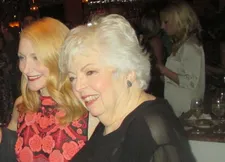 |
| Letters From Baghdad executive producer Thelma Schoonmaker with Patricia Clarkson |
AKT: Which makes it 1929.
SK: 1929, 1930. When you hear voices, just voices, and do research, you will note that these people were not alive at that time anymore. For example, there is the scene with Lord Cromer, hearing his letter saying she is the only one that knows the Arabs and she should be hired. "I am very happy that she had been hired by the admiralty." It's a very funny letter because he is making a comment on how inefficient the British government is when they promise to hire people that really know about the work.
ZO: In terms of going back a little bit to your question about the costumes - that was a very, very challenging thing with many decisions. We were very conscious of not wanting to make a period drama and we did not want to make period recreations. So we always went very consciously to the most understated, accurate costume. But that a contemporary audience wouldn't say immediately, ah, 1920s! It was an almost subliminal knowledge that they were people who potentially lived a hundred years ago.
AKT: I noticed the shape of the collars, some of the earrings, things like that. Very early on, Vita Sackville-West introduces us to Gertrude by making a comment like - there she emerged out of the desert with all her evening gowns and cutlery. Is this from a diary? A letter?
_225.webp) |
| Letters From Baghdad: "The idea is - let's bring, let's transport the viewer into that time and experience what happened firsthand." Photo: Anne-Katrin Titze |
SK: It's from A Persian Journey, or something like that.
ZO: It's a reminiscence, a published account.
AKT: Because she lived in Constantinople for a while, right?
ZO: Yes. She went through Baghdad. She met Gertrude Bell in Baghdad, whom she had met before. As Virginia Woolf was also a contemporary of Gertrude Bell. They had similar social circles.
AKT: Were there letters to women Gertrude Bell wrote? Because we mostly hear letters to her father and to men.
SK: We found a few letters to other women. To Lisa Robinson. It was a friend of her mother, actually her stepmother. And to Florence Lascelles.
ZO: Primarily the letters, and you have to appreciate that, those were the letters that were saved in archives. She wrote letters every day to a lot of people. She certainly wrote letters to her dear friends, male and female. The ones that were saved in archives happened to be to her family, to her colleagues.
AKT: The two love stories are wonderfully presented. When you start to introduce Lieutenant Colonel Wylie "Call me Dick" and his wife. What you show are the emotions in the grass, the splendor in the grass, the fields, the wind is blowing and nature is swaying. That is something I very much appreciate in a documentary. Not just one-to-one political information clips - you use archival footage to set the mood as well.
ZO: We always intended to create something that would be evocative as well as informational. It was always a balance between history and information and getting into Gertrude Bell's mind and exploring her emotions. We always had that underlying interest in finding the right balance and in making something beautiful - because the visual is most important to us.
_225.webp) |
| Slavoj Žižek covering his eyes the evening of Donald J Trump's early morning victory over Hillary Clinton Photo: Anne-Katrin Titze |
SK: This was the time of the beginning of movies, it was the beginning of cinema. A lot that was captured was almost like snap-shooting. You know, going out and shooting a scene in Baghdad. Some of these scenes are very observational. You have to create a balance with something that is really personal and internal.
We have, I think, 500 clips in the film. But we had about 1200 clips. So we would start making lists of things. We like sunsets, the ocean, and then, you know, things that could be more evocative and could be used in sections that ask for something much more emotional and personal.
ZO: That was our challenge, was to find something that nobody would think to use.
AKT: It's great when you use nature at the moment when you have Dick writing "My wife doesn't see my letters." It's all in there. Another thing I noticed was that one of you or both must really like dogs.
Zeva and Sabine begin laughing.
ZO: You saw it. You noticed those dogs running along!
SK: And birds!
AKT: Yes, birds, too. I saw lots. The birds, the Mute Swans.
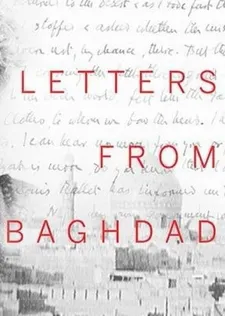 |
| "One of the things that struck us when we were reading her letters was that they were very vibrant." |
SK: Yeah, you know, it brings a little humour in it.
AKT: While I was waiting in the office, I was talking to Paula who told me she was working on a shorter version.
ZO: And you said, don't take away any of the dogs?
AKT: I did.
SK: Are you a dog person?
AKT: Yes. Anything - dogs, birds, cats, horses, elephants. I'm also a wildlife rehabilitator.
We have a short excursion into wildlife hazards in the city, which had to be cut short because I had to leave to be on time to hear Slavoj Žižek speak at NYU, who that day was the second best known Slovenian in the world.
Coming up - Zeva Oelbaum and Sabine Krayenbühl on casting Letters From Baghdad, Winston Churchill and T.E. Lawrence with Gertrude Bell, Whirling Dervishes, a maypole dance, Dorothy Arzner's Christopher Strong starring Katharine Hepburn, Werner Herzog's Gertrude Bell, Nicole Kidman, and Ridley Scott's interest in the Desert Queen, executive producer Thelma Schoonmaker and Ahead Of Time: The Extraordinary Journey Of Ruth Gruber.
DOC NYC screening: Saturday, November 12 at 11:15am - SVA Theatre; Expected to attend: Zeva Oelbaum, Sabine Krayenbühl, composer Paul Cantelon and executive producer Thelma Schoonmaker.
The seventh annual DOC NYC runs through November 17.
Letters From Baghdad will be screening in the International Documentary Film Festival Amsterdam on November 20, 21, 24 and 25.





















